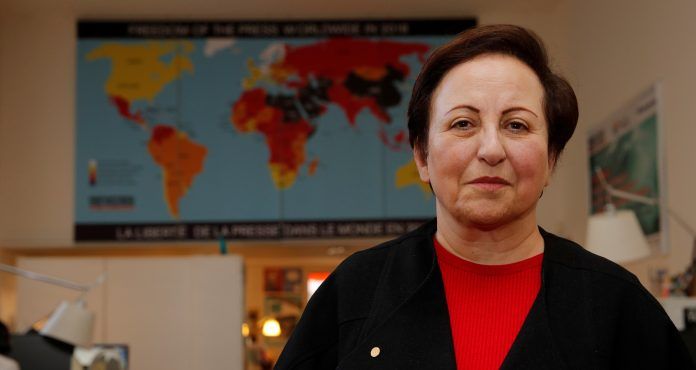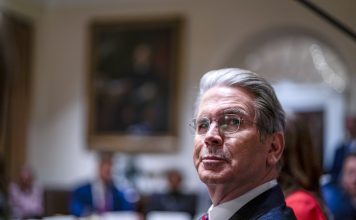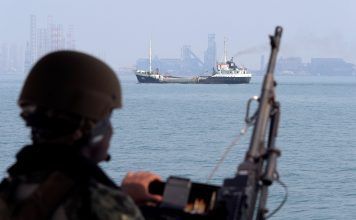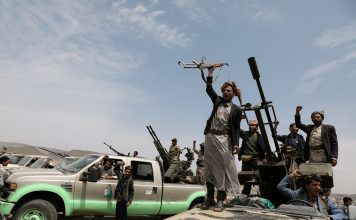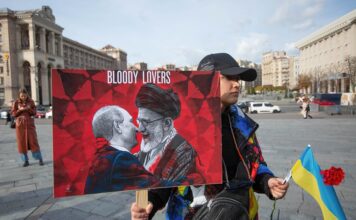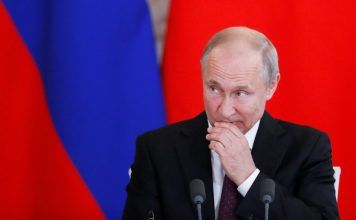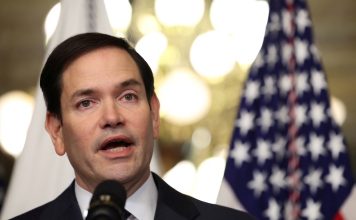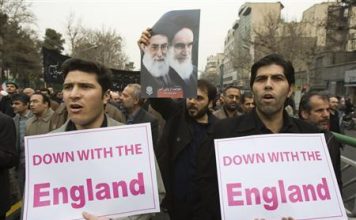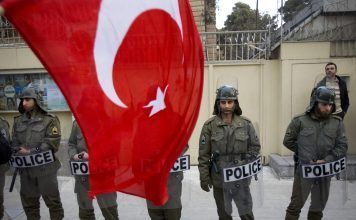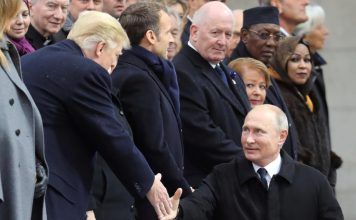By Benjamin Weinthal
Shirin Ebadi, the first-ever Nobel Prize laureate from Iran, in late September issued a scathing indictment of the former high-level Iranian government official Seyed Hossein Mousavian and institutions that host him, because of his alleged role in the assassination of Iranian dissidents.
Mousavian was the Islamic regime’s ambassador to Germany from 1990 to 1997.
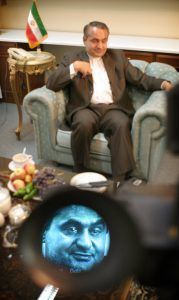
Ebadi, who has been following the mainstreaming of Mousavian’s pro-Iran regime views in the United States and Germany, wrote on her Telegram page, “As I had previously mentioned, the ‘discursive tools’ of the Islamic Republic can be as dangerous as deadly weapons. The discourse of whitewashing and normalization paves the way for the regime’s crimes inside the country and its other actions in the region.”
She continued, “Recognizing individuals who have been complicit in the crimes of the Islamic Republic and providing them with unilateral platforms, without questioning their role during the time of these crimes, is an affront to truth and justice. Hossein Mousavian is among those who are repeatedly invited to various institutions and universities to speak on ‘international relations.’ He was the head of the ‘First Western Europe Office’ at the Foreign Ministry during the darkest period of the Islamic Republic’s rule.”
The dramatic statement from the first woman from the Muslim world to win a Nobel Prize continued, “The Mykonos assassination [of Kurdish dissidents in Berlin] and the murder [in Bonn] of [Iranian artist and activist] Fereydoun Farrokhzad took place during his ambassadorship. The German government accused Mousavian of complicity in these assassinations and several others in Europe and expelled them from Germany.”
Ebadi also countered Mousavian’s view that he is a victim of Iran’s government because the administration of former president Mahmoud Ahmadinejad arrested him in 2007 for alleged espionage. Mousavian was cleared of the spy charges.
OPINION: On Seyyed Hossein Mousavian’s Presence at Princeton University
She wrote, “The internal power struggles within the regime created a rift between Mousavian and a faction of the ruling elite. However, this distance does not absolve international legal institutions of their responsibility to question him.”
In emails to this reporter in November 2023, Mousavian flatly denied any role in the Islamic Republic’s assassination of Iranian Kurdish dissidents at the Mykonos restaurant in 1992.
Lawdan Bazargan, the Iranian-American human rights activist who is overseeing an international campaign run by the Alliance Against Islamic Regime of Iran Apologists (AAIRIA) to compel Princeton University to fire Mousavian, approached Ebadi for a comment about him, ahead of his talk at Dartmouth College on September 30.
Ebadi said, “Hossein Mousavian is scheduled to speak at Dartmouth College in the United States. … I hope this college and other institutions that grant platforms to people like Mousavian to discuss the ‘future of the Middle East’ will also allow the regime’s opponents to ask him about the Islamic Republic’s role in the current state of the Middle East and the world!”
Video footage from the group “From Boston to Iran” captured its members’ questioning of Mousavian at Dartmouth. They wrote on X that they “challenged his stance and role as a regime agent propagating the terrorist regime agenda.” The interaction with Mousavian at Dartmouth can be viewed here.
The Iranian-American activists from Boston stated, “We called out his role in the assassination of Iranian dissidents and his propaganda work for the Islamic regime.” As of this writing, more than 2,000 people have signed From Boston to Iran’s Change.org petition against Mousavian.
Victoria Holt, the director of the John Sloan Dickey Center for International Understanding at Dartmouth—the institute that hosted Mousavian—declined to answer Kayhan London queries.
Jason Brodsky, the policy director of the U.S.-based United Against a Nuclear Iran (UANI), told Kayhan London, “I think college campuses like Dartmouth need to do better due diligence about whom they are inviting to speak on campuses. Hossein Mousavian was the Islamic Republic’s ambassador in Germany at a time when Iranian dissidents were assassinated by the regime on German soil.”
Brodsky added, “His embassy was used as a planning headquarters for the assassinations. It is wholly inappropriate and disrespects the victims of the regime. At a time when there are growing concerns about foreign influence operations in American higher education, platforming these kinds of figures sends the wrong message.”
Mousavian’s antisemitism has prompted criticism in the German left-wing Die Tageszeitung (taz) daily and from American experts on antisemitism. Shortly after the Iranian government-backed terrorist movement Hamas slaughtered nearly 1,200 people in southern Israel on October 7, 2023, Mousavian took to X and likened Israel to Nazi Germany.
Dr. Charles Asher Small, the founding director and president of the Institute for the Study of Global Antisemitism and Policy (ISGAP), told Kayhan London: “Dartmouth University has engaged in a public relations blitz in recent months, that tries to portray itself as a special university that has somehow set itself apart—a place with no antisemitism.”
Small continued, “This public relations program is full of contradictions. The most recent example of blatant antisemitism—as well as anti-democratic tendencies—is the invitation of Hossein Mousavian, who is implicated in crimes against humanity for his role in the Iranian regime that calls for the destruction of Israel, the murder of Jews, the subjugation of women and the murder of gay people and political opponents of the totalitarian regime.
“For a university to invite this person as an esteemed guest is a travesty. It is just another example of the normalization of antisemitism in US higher education,” Small said.
Mousavian took to his X account and blasted Iranian-Americans opposed to the Islamic Republic and boasted about ignoring press queries about the Dartmouth event. Mousavian termed the Iranian-Americans who objected to his participation in the Dartmouth discussion “treacherous.”
Mousavian joined Suzanne Maloney, the Brookings Institution’s vice president and director of its Foreign Policy program, at Dartmouth College for a discussion on: Israel and Iran: The Future of the Middle East. Kayhan London press queries to Maloney and Brookings were not answered.
The press queries to Maloney asked her about Mousavian’s reported support for the Ayatollah Ruhollah Khomeini’s fatwa to assassinate the British-American writer Salman Rushdie and for his alleged support for Hezbollah and Hamas.
Mousavian’s support for the fatwa and the UK-designated terrorist organizations, Hamas and Hezbollah, was outlined in a detailed report by the Middle East Media Research Institute (MEMRI). Mousavian did not immediately respond to Kayhan London press queries.
The Alliance Against Islamic Regime of Iran Apologists said in a statement ahead of the Dartmouth event: “In addition to his troubling past, just a few months ago, Mousavian wrote an article praising Ebrahim Raisi, the former Iranian president and a key figure in the 1988 massacre of political prisoners. Raisi, a member of the ‘Death Committee,’ was implicated in issuing death sentences to thousands of political prisoners. This atrocity was acknowledged in the recent Swedish court case of Hamid Nouri. Mousavian’s defense of Raisi further demonstrates his alignment with a regime involved in atrocities and genocide.”
Ebadi’s criticism also encompassed the Hamburg-based Körber Foundation,where Mousavian was invited to speak last spring.
AAIRIA helped organize a June demonstration against the pro-Iran regime Körber Foundation in Hamburg, Germany. Mousavian has a long relationship with Körber—a think tank founded by the ex-Nazi Kurt Adolf Körber who exploited female concentration camp victims to advance the Hitler movement’s weapons production.
Lothar Dittmer, chairman of the Körber Foundation, has declined to say if Körber will sever relations with Mousavian the Islamic regime.
Regime Change Is Only Solution For Iran, Say DC Conference Speakers

